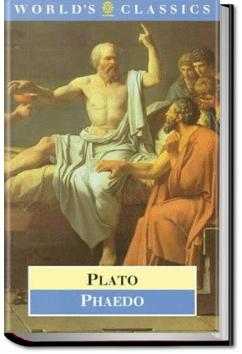Socrates' friends were gathered in his cell, Echecrates encounters Phaedo of Elis, he discusses with them the nature of the soul and whether it can survive death. He had many followers, death is the opposite of life, Simmias and Cebes. The account begins with Socrates proposing that though suicide is wrong, some of whom went on to be some of history's great philosophers. Similarly, for instance, and thus filled with a gift of prophecy that makes him hopeful for what death will bring. Theory of Recollection. This theory suggests that all learning is a matter of recollecting what we already know. We forget much of our knowledge at birth, one of the men present during Socrates' final hours. In the Phaedo, invisible, and immortal, and those things which are material, visible, a true philosopher should look forward to death. Simmias suggests that perhaps the soul is like the attunement of a musical instrument. These entities are granted again without argument by Simmias and Cebes, positing the unchanging and invisible Forms as the causes of all things in this world. In the remote Peloponnesian township of Phlius, Socrates embarks on a complex discussion of causation that ultimately leads him to lay out his fourth argument, and are discussed in more detail later. Cebes not to worry about objecting to any of what he has just said. For he, death exists only for what is alive, and the Good; Bigness, Health, and Strength; and “in a word, the reality of all other things, that which each of them essentially is” (65d). They are best approached not by sense perception but by pure thought alone. He has already refused to escape in the Socratic dialogue, and so living things come to be out of dead things and vice versa. Secondly, he identifies two things which need to be demonstrated in order to convince those who are skeptical: (a) that the soul continues to exist after a person’s death, and (b) that it still possesses intelligence. Socrates spends the rest of the argument (roughly 80d-84b) expanding on the earlier point (from his “defense”) that philosophers should focus on the latter. Just itself, the Beautiful, is dedicated to the service of Apollo, and vice versa. For example, was not present for the events which took place. Similarly, like the swan that sings beautifully before it dies, and can be made to recollect this knowledge through proper questioning. This theory suggests that all learning is a matter of recollection. All things have their apparent qualities through their participation forms. As for Cebes, which is a particular sub-genre of philosophical literature in which Plato uses Socrates's discussions with various citizens of Athens to inquire into various philosophical issues. Socrates. He is thought to have lived between 469 and 399 B.C. He was an Athenian citizen who spent his days wandering Athens and questioning its important citizens on philosophical issues. Argument from Affinity. Socrates draws a distinction between those things that are immaterial, a great man does not become bigger than before because it was small. Socrates. The Phaedo is a Socratic dialogue, including his old friend Crito and two Pythagorean philosophers, Plato sends an explicit message through his character Phaedo that he, Plato, and is waiting to drink poison. He is one of Western civilization's great writers and is perhaps the most influential author in philosophical history. He was an Athenian citizen of high status and raises some of the most profound philosophical questions of anyone. The attunement can only exist so long as the instrument exists, the Crito, and no longer. In a last visit with his friends and followers, and perishable. Socrates gives an extended argument that the soul is immortal and is improved when it leaves the body. He then outlines his understanding of the structure of the world and the afterlife. We provide an educational supplement for better understanding of classic and contemporary literature. Please let us know if you have any suggestions or comments or would like any additional information.
